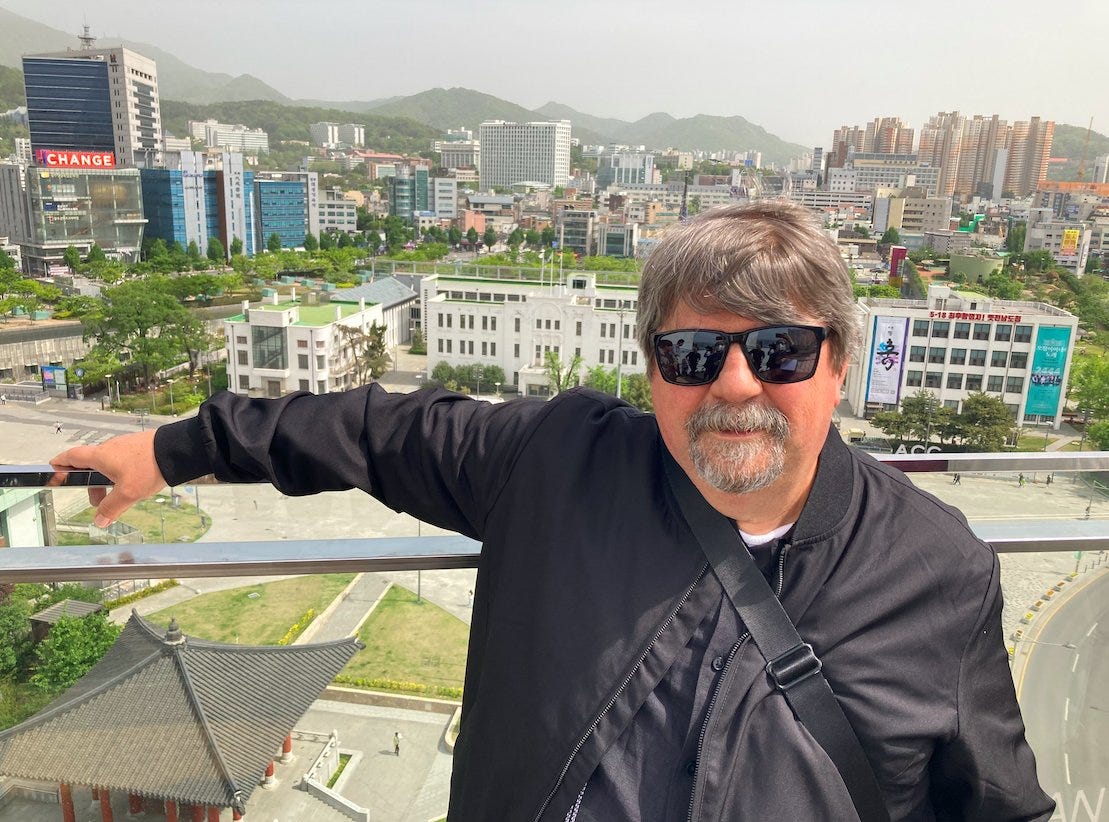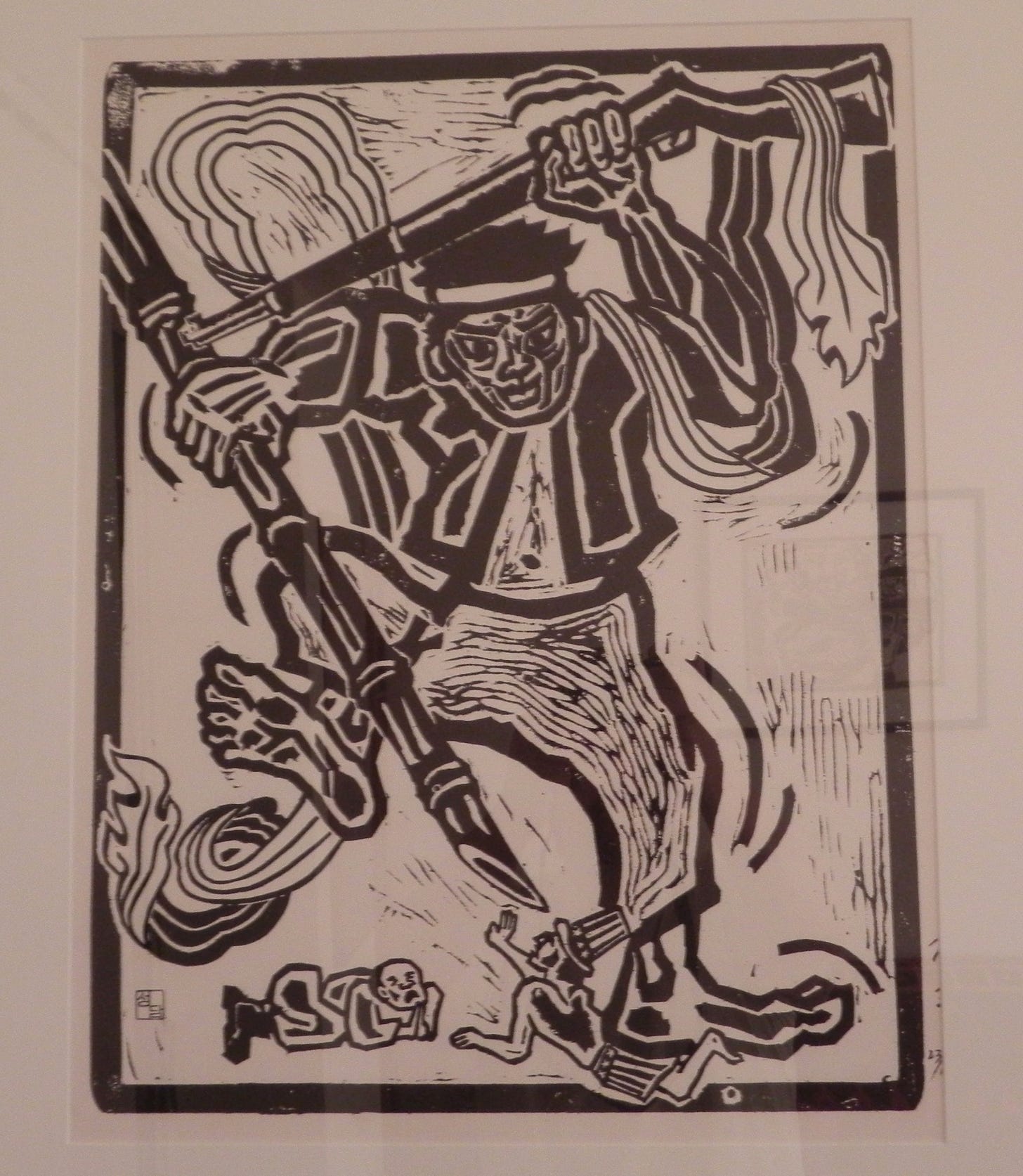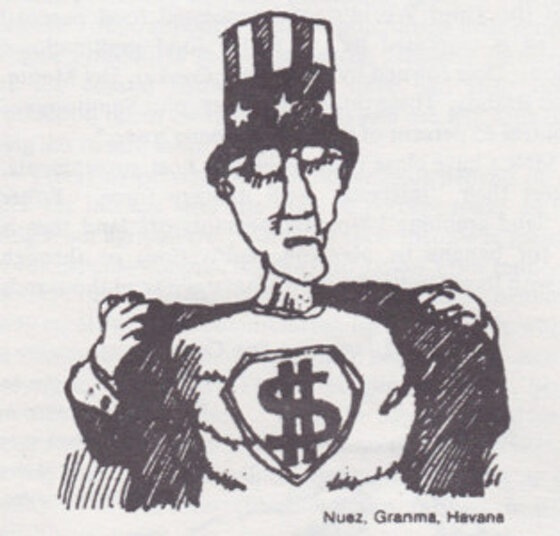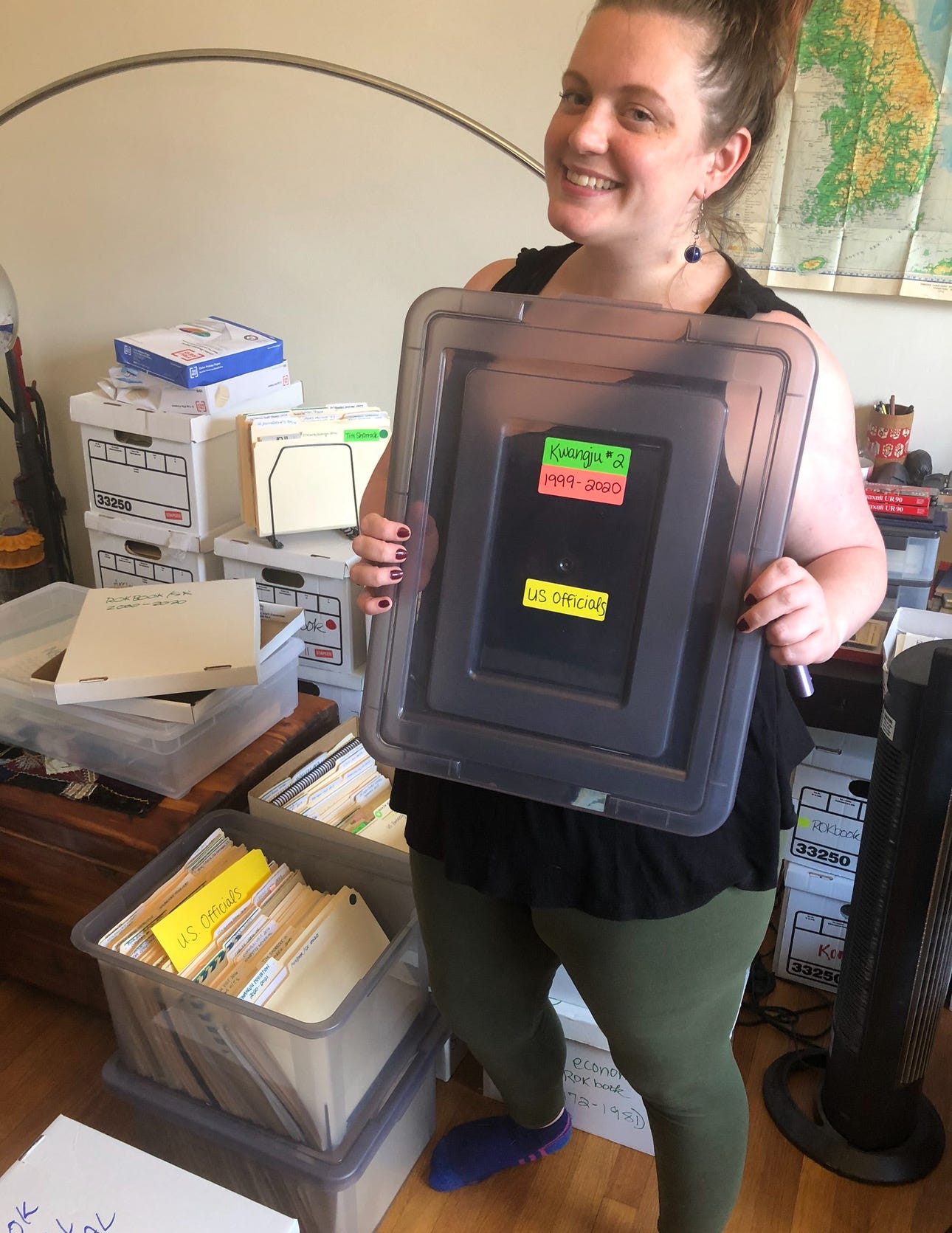Welcome to Empire Blues!

Hello readers, far and wide! You may recognize me from Facebook (where I’ve been since 2007), Twitter (2008), and BlueSky (2024). Or you may know me from the hundreds of articles I’ve written for The Nation and other US and foreign media outlets since moving to Washington, DC, in 1982. Throughout that time, I’ve been laser-focused on the Koreas, Japan and Okinawa, US militarism, global trade and labor, American foreign policy, and the corruption of the national security state.
That will all continue here, but with a few twists and turns along the way. Even better, it will eventually come with a podcast of sorts that I will call Tim’s Izakaya, named after the cozy late-afternoon eating and drinking places in Tokyo where people coming home from work or a hard day stop by for drinks and healthy food and hang with friends and neighbors to discuss what’s happening in the world and their lives. People have always told me I’d make a good bartender, so here’s my chance. I hope you will join me.

What You’ll Get as a Subscriber
I’m going to start Empire Blues as a free site that you can follow or subscribe to any time. When you make the switch to paid customer, this is what you’ll get with a minimum $5/month subscription:
A weekly report on Korea, Japan, and US militarism in the Pacific.
Daily updates as “notes” that will replace most of my posting on X and Bluesky.
One investigative report per month (when I switch to subscriber mode, my features will be free for 3 days before they go behind the paywall).
A “document of the day” at least twice month, with detailed explanations of their content and origins (3 days free).
Frequent podcasts and commentaries once I figure out the technology (I’m almost there).
Exclusive excerpts from my upcoming book, DMZ Empire.
An ability to segment your reading by subject: Korea, Japan, Cold War DC, Gwangju, Doc of the Day, Spies for Hire, and Chimes of Freedom (Bob Dylan and World Boogie).
That’s for starters. I’ll see how it goes and make changes accordingly. My own time will be a factor. I’m deep into writing DMZ Empire, covering the hidden stories of US intervention in Korea and Japan after World War II, and am circulating a proposal and draft chapters it to agents and publishers. Once I get a contract, I’ll have to balance my time between the book and my journalism. But from the launch of Empire Blues, I’ll provide a hefty balance of new and old material to you and use my podcast and notes as a sounding board to discuss the stories I’m reporting about.

So Why Subscribe?
Because what you see is what you get. I’m completely independent. I don’t get any money from think-tanks, foundations, unions, or governments. Nor do I have any institutional backing. So I’m not beholden to any political party or organization, just the truth.
My only funding comes from people like you - the rank & file fighting for a better world and like the way I write - maybe because I’m free to say whatever I want, always with a careful eye on the facts.
I know these newsletters are a dime a dozen these days and that you’re probably inundated with requests from other writers to join their Substacks, Ghosts, or Patreons. Or you may have one yourself. If you decide to become a paying supporter, your subscription will:
Help me re-establish a platform after a year of personal trauma (explained below) that will take my literary career through the next 10 years and beyond. It will also help me keep my legacy website, The Shorrock Files, up and running. It will continue to be a repository for the thousands of documents I’ve collected over the years and my freelance reporting since I started the site in 2006. Content on my existing Patreon will remain there, with many of its posted transferred here.
Allow me to continue my investigative reporting and acerbic commentary on East Asia, the military industrial complex, privatized intelligence, and the musical world of Bob Dylan. That’s the kind of stuff I’ve been writing since moving to DC in the winter of 1982 during the Reagan administration, an earlier era of right-wing transformation, racist reaction, and economic uncertainty that marked the beginning of our long slide into the Trump-style fascism we face today.
Display my work in the best style possible. After considering the alternatives, including my own Patreon, I decided that Substack’s professional format makes it the best site for journalists like me who want to expand their audience and win respect from the reading public. With all the great writers using and sharing this space, I feel like I’m back in the newsrooms I loved working in during my reporting days. And I can finally start my podcast!
Help me stay healthy (not wealthy) and wise. I’m like everybody else these days, in need of basic income to cover the growing costs of living, health care, and everything else. My primary source of earnings is Social Security (long may it wave), the modest union pension I luckily earned from one of my jobs, and the 401-K from my years as a journalist and trade unionist. Every little bit helps.
My Brilliant Career
As a subscriber, you will draw on my extensive record of investigative reporting over the past half-century. Since the early 1980s, I’ve worked and reported for a wide range of publications and organizations, both here and abroad, and have learned much from each. They include:
Pretty much the entire left press. From my years in graduate school in the late 1970s to the early 1990s, I wrote regularly about South Korea for the National Guardian, the radical weekly in New York. In 1983, shortly after arriving in Washington, I began a long period as a freelance Nation correspondent on the Koreas, labor, and US intelligence (I believe I may be their longest serving writer - 42 years). My byline has also appeared in In These Times, The Progressive, Salon, Jacobin (as an interview subject) and Mother Jones (much to my regret). I’ve written for and been interviewed by Doug Henwood of Left Business Observer, and have appeared dozens of times on Amy Goodman and Democracy Now! I also appear in South Korea’s Hankyoreh, Seoul’s only progressive daily newspaper, and in other Korean and Japanese publications.
The business press. From about 1987 to 2003 or so, I was a maritime, trade, and labor reporter for The Journal of Commerce and the Washington corrrespondent for business and shipping publications in South Korea and the UK. That’s how I began covering globalization and the tension between labor and capital over the export of jobs and capital that’s burst into attention with Trump’s drastic reordering of the global system of “free trade” with tariffs and extreme protectionism. Reporting for the JOC greatly broadened my knowledge of labor issues and how workers have suffered by being played against each other in the intense global race for competition and profits.
The “public interest” press, as exemplified by Multinational Monitor, the Ralph Nader magazine I came to Washington to work for in 1982. That experience ended badly: I was fired in 1984 after trying to organize a union, which also got me blacklisted from the DC public interest industry (my story about that incident, “Nader & Me,” will be published here soon - it's a bit of a shocker). At the same time, during my years at the Monitor I was introduced to the DC community of anti-globalization activists, giving me an inside look at how the pro-labor left operates (and sometimes manipulates).
The “mainstream” press. Like any good reporter in DC, my work has been picked up by all segments of the legacy media, both print and television. My scoops over the years have been covered by the CBS Evening News, the Washington Post, Business Week-Bloomberg, and even the New York Times. I’ve written op-eds on US intelligence for both the Times and the Post, and have been interviewed by a wide variety of foreign media from Al Jazeera to South Korea’s MBC. During the 1980s, I was a stringer in Seoul for several newspapers in California, including the San Francisco Chronicle and the Oakland Tribune.
Finally, I’ve been a union man all my life and was twice elected a shop steward in my workplace. I’ve also worked as a researcher for industrial unions, including the UAW, the United Steelworkers, and the National Air Traffic Controllers Association. In my last job before retiring, I was a privatization researcher for AFGE, the nation’s largest federal union, where I helped federal workers fight the explosion of contracting that I wrote about in my first book, Spies for Hire.
My reporting over those years gave me deep insights I can share as we battle the twice elected MAGA dictatorship - or, as I call it, The Mar-A-Lago Nazi Regime - and I continue to expose the hidden histories of US empire in the Asia-Pacific region.
Digging Into DC’s Cold War Past
Like many journalists with any experience, I’ve left a lot of stories on the cutting floor or seen them killed by editors who see themselves more as gatekeepers than wordsmiths. Plus there’s plenty of stories that I never could find a publisher for, or just buried out of frustration and lack of time. Part of what I’m going to do here is bring these hidden stories to life and make them relevant today.
Waiting in the wings are stories on Nippon Steel and the economic nationalists and unions who tried to block its takeover of US Steel; the CIA roots of the Center for Strategic and International Studies, the most powerful think tank in Washington; and profiles of key members of what I call the national security syndicate, that is, men who’ve made a practice of the revolving - or spinning - door between high-level government service and defense and intelligence contracting.
I’m preparing features on people like Frank Carlucci, the former deputy director of the CIA and the first secretary of defense to ever work for a military contractor after leaving office, and the wild neocon James Woolsey, who started a private equity company to invest in national security the very day the Twin Towers fell in New York. These stories will help inform your understanding of the present. The first piece in that series will focus on the late Richard Armitage, once a quasi-hero to DC liberals for his opposition to the Bush neocon agenda while working for Colin Powell but in reality a crafty intelligence contractor and one-half of the US brain trust at CSIS that spent over 30 years successfully persuading Japan’s permanent LDP government to remilitarize and become a US military errand-boy in the Asia-Pacific.
And then there’s the politics of DC and the ebbs and flows of the US left. The American Left is where my heart is, and always has been. But not all I’ve seen has been positive - far from it. I’ve witnessed “solidarity” groups turn into personality cults totally out of touch with rank-and-file organizers. Others spent most of their energies raising money from liberal foundations, who gave them generous grants in part to steer them away from radical politics. These foundations tend to be key backers of the elite (mostly white) liberal left in Washington, but can be as harmful in deflating left, anti-imperialist politics as the right-wing MAGA conservatives with their money bags. Just like we need labor reporters to keep unions honest, we need political reporters to monitor the anti-fascist, antiwar left as well. As I learned early on in DC, no organization (or founder) should be sacrosanct from public scrutiny or immune from public questioning.
Why Now?
In short, out of grief and perseverence. As many of you know from my social media posts over the last 14 months, I lost my precious daughter Roxanne Shorrock on March 17, 2024. She was just a few days short of her 36th birthday and was the pride and joy of my life. Here is what I wrote in tribute to her.
Roxanne was everything to me, and a very talented writer beloved to her circle of friends. She was born on April 3, 1988, in Washington and was a true citizen of DC. She loved its diversity and was a strong believer in social justice. She went to Blair High School in Silver Spring and went to college at the University of Maryland. Roxy loved music, and I’m so glad that I took her to two Bob Dylan shows – she loved his songs.
Roxy was also a fantastic organizer. During the worst period of the pandemic, from 2020 to 2022, she worked with me on the early stages of my book DMZ Empire, organizing nearly 50 years of files, complete with her neat handwriting and a database (I paid her union scale, and often joked with her that she made more from me than I ever made from The Nation!) When she died, I went into deep mourning; I remain heartbroken by her loss, and miss her every day.
As I managed to get my feet on the ground last winter, I decided I want to leave behind, in her honor, the work I produced while she was on this earth. This new site will give me a fresh start at that, and will stand as a memorial to Roxanne and her wonderful spirit. For all those who have contacted me to express your solidarity over the last year, thank you for your support. You will not be forgotten! 🌺
This is for you, Roxy!
Subscribe to get full access to the newsletter and publication archives.






